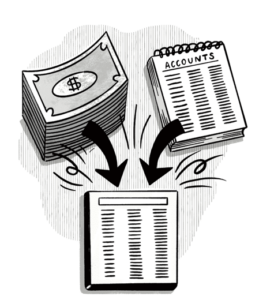Article (20)(5)(a) of the Corporate Tax Law authorizes the MoF to ‘prescribe … the circumstances and conditions under which a Person may prepare financial statements using the cash basis of accounting’. On May 9, 2023 the MoF exercised this authority in Decision No. 114 allowing to ‘prepare Financial Statements using the Cash Basis of Accounting, in any of the following instances:
- Where the Person derives Revenue that does not exceed AED 3,000,000.
- In exceptional circumstances and pursuant to an application submitted by the Person to the Authority’.

What else do we know about this cash method? Neither the Corporate Tax Law, nor IFRS gives a clue to such questions as:
Shall an advance payment be recognized as revenue before an obligation is performed or shall it work as payment plus performance?
Example 1.
A company received an upfront payment for goods to be delivered in the next financial year. In the next year, this payment was returned since the company failed to supply the goods that had been paid for.
The question is simple. Shall the company recognize the advance payment in its revenues in first year and as losses in the second?
Example 2.
Let’s replace in the Example 1 the failure to deliver the goods with actual delivery in subsequent periods.
May the supplier recognize the revenues in the subsequent years?
The same question stands for expenditure. Shall an upfront payment for the goods that haven’t been delivered, and for services that haven’t been provided reduce the corporate tax base?
Example 3.
You are a calendar year taxpayer and pay AED3,000 in 2024 for a business insurance policy that is effective for 3 years (36 months), beginning on July 1, 2024. May this cost be fully recognized in 2024 or is it deductible only in the year to which it applies, i.e. only $500 (6/36 x $3,000) is deductible in 2024, $1,000 (12/36 x $3,000) is deductible in 2025, $1,000 (12/36 x $3,000) is deductible in 2026, and the remaining $500 is deductible in 2027? I picked this example with some adjustment from IRS Publication 538 (Rev. January 2022) Cat. No. 15068G Accounting Periods and Methods, page 9.
Shall paid expenses be consumed to reduce revenues?
Example 4
A taxpayer paid for raw materials delivered to him in 2023. They remain kept in the warehouse by the end of the financial (tax) period and are consumed in 2024. The goods produced out of them in 2024 have been sold in 2025. Payment for them has been received and recognized in the corporate tax base under the cash accounting method in 2026.
Which period shall be chosen to reduce corporate tax base here?
A transitional issue. Shall a taxpayer elected cash method recognize in a 1st tax period payments received for the previous period?
As per Art. 61 of the Corporate Tax Law, ‘a Taxable Person’s opening balance sheet for Corporate Tax purposes shall be the closing balance sheet prepared for financial reporting purposes under accounting standards applied in the State on the last day of the Financial Year that ends immediately before their first Tax Period commences, subject to any conditions or adjustments that may be prescribed by the Minister’.
If a taxpayer opts to apply the cash method, does he have to rearrange his opening balance sheet accordingly?
Example 5
A taxpayer’s 1st tax period starts on January 1, 2024. In the financial statement for 2023, this taxpayer recognized revenues, which are yet to be paid, in subsequent periods.
Shall these receivables be included in the opening balance sheet of a taxpayer that opted for the cash method (in relation to the pre-tax year) or is this adjustment inappropriate and the taxpayer has to include revenues in the corporate tax base upon settlement in subsequent years?
There is the same question for expenditure. May a taxpayer deduct costs paid after the 1st tax period has commenced but recognized previously in the financial statements?
Example 6
A taxpayer resold goods in 2023 before the 1st tax period commencing in January 1, 2024. He paid suppliers for these goods in 2024.
Shall the debt to the suppliers be recognized in the opening balance? May the taxpayer deduct the amount it paid in 2024?
How shall the cash method work for assets on capital accounts?
Example 7
A taxpayer paid for equipment in 2023. He received it in 2024 and put it into operation in 2025. Does the cash method mean that the taxpayer may start to depreciate this asset in 2023 for corporate tax purposes?
Example 8
A taxpayer bought equipment and put it into operation in 2024 but shall pay for it in the next 4 years in equal installments. The useful life is 3 years.
In 2024, he may recognize no depreciation as nothing has been paid. In 2025, he may recognize part of this year’s payment, roughly a half of it: ¼ for 2024 and ¼ for 2025. In 2026, the useful life of the asset is over and the taxpayer derecognizes it and sells it. However, he is still due to pay installments in 2027-2028.
The taxpayer deducts the whole amount paid up to this moment except to the extent deducted in 2025.
In 2027 and 2028, does the taxpayer deduct the installments at the times when they are settled in the depreciation line regardless of the fact that asset is gone?
Or may the taxpayer deduct the whole installment at the moment of settlement regardless of the nature of the assets and period of their actual consumption?
The MoF’s Explanatory Guide sets out that ‘an amount of expenditure is allowed as a deduction in the Tax Period in which it is incurred. When a cost or expenditure is incurred will depend on the Person’s basis of financial accounting (see Article 20). In broad terms, a Person accounting on a cash basis incurs expenditure when it is paid and a Person accounting on an accruals basis incurs expenditure when the obligation to pay arises (i.e. when it is irrevocably committed for payment)’.
Actually, this doesn’t respond to the questions above. In the accrual basis, an obligation to pay is a must to recognize costs but it goes hand in hand with other conditions to be met. In Example 3 it is consumption. In Example 4 it is:
- consumption to be accounted for in the cost of the product produced in the statement on the financial position,
- a sale to be recognized in the P&L as the cost of of goods sold (COGS).
It seems obvious that the MoF didn’t mean in its Explanatory Guide that the obligation to pay is enough to deduct in the accrual method. Rather it meant it as one of the requirements. If so, you may hardly assume that in the same paragraph another approach is applied to describe the cash method. Rather, the Ministry meant the same: settlement is also one of the conditions (additional one) to recognize cost, those which distinguishes the cash method from the accrual one.
Example 3 given above is resolved by IRS (the US) in this way: Even if a taxpayer opted for the cash method ‘the general rule that an expense paid in advance is deductible only in the year to which it applies is applicable to this payment because the payment does not qualify for the 12-month rule. Therefore, only $500 (6/36 x $3,000) is deductible in 2021, $1,000 (12/36 x $3,000) is deductible in 2022, $1,000 (12/36 x $3,000) is deductible in 2023, and the remaining $500 is deductible in 2024’. The 12-month rule is a rule specifically addressing the cash method. It allows the US taxpayer a one-off recognition if the period to which the cost is applicable is less than 12 months.
The US taxpayer faces similar consequences in Example 4.
In Examples 7 and 8, the UK allows its residents to include in deductible expenses ‘equipment you buy to keep and use in your business as a normal allowable business expense rather than as a capital allowance’.
In my opinion, there are 2 possible approaches to handle the cash basis of accounting. One may name them “IFRS plus” and “IFRS minus”:
- IFRS Plus supposes that settlement is a condition to be complied with in addition to IFRS.
- IFRS Minus, to the contrary, requires the rearrangement of all IFRS rules that hinder the recognition of revenues and expenses at the moment of settlement.
To implement IFRS Minus, the MoF ought to resort to Art. 20(5)(b) of the Corporate Tax Law. This authorizes the Minister to prescribe ‘adjustments to the accounting standards to be applied for the purposes of determining the Taxable Income for a Tax Period’. The MoF hasn’t exercised this right yet. This indirectly indicates that they are leaning in favor of the IFRS Plus method. However, Art. (20)(5)(a) of the Law cited above allows to ‘prepare financial statements using the cash basis of accounting’, rather than to adjust financial statements. This (also indirectly) points to a position that IFRS Minus was the plan. Thus, some more clarity from the MoF would definitely help here.
***
Warning: Pursuant to the MoF press-release issued on 19 May 2023 “a number of posts circulating on social media and other platforms that are issued by private parties, contain inaccurate and unreliable interpretations and analyses of Corporate Tax”.
The Ministry issued a reminder that the official sources of information on Federal Taxes in the UAE are the MoF and FTA only. Therefore, analyses that are not based on official publications by the MoF and FTA, or have not been commissioned by them, are unreliable and may contain misleading interpretations of the law.
See the full press release here.
You should factor this in when dealing with this article as well. It is not commissioned by the MoF or FTA. The interpretation, conclusions, proposals, surmises, guesswork, etc., it comprises have status of the author’s opinion only. Like any human work, it may contain inaccuracies and mistakes that I have tried my best to avoid. If you find any inaccuracies or errors, please let me know so that I can make corrections.
